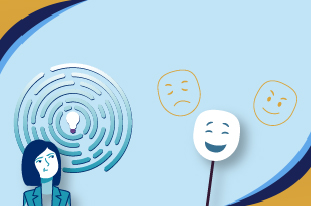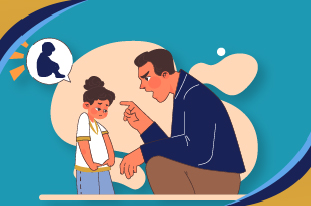Parentification is a type of parental neglect where a child, especially the oldest one, is forced to act like a parent for their family members and elders. He is to accept a caretaker role and provide practical and emotional support to the adult. Prentification steals the childhood of a kid by forcing them to shoulder adult responsibilities, with economic and emotional support.
When a child is forced to act like an adult, it is called parentification. This usually happens when a kid takes on responsibilities that are way too big for their age.
But parentification is not about giving help in household chores, like cleaning, cooking, or washing dishes. Instead, these kids are expected to become pseudo-parents at an early age, long before they are ready to handle it mentally and physically.
This kind of reversal role is a type of emotional abuse. Sometimes abuse is obvious, like name-calling or controlling every aspect of a life. But parentification is a hidden, quiet kind of trauma.
A child ends up caring for their parents, either physically, emotionally, or economically, and takes all the adult responsibilities.
This situation can happen for many different reasons:
- A parent is sick and cannot care for themselves.
- A parent struggles with substance use.
- A parent has mental health challenges.
- There are no other adults around to help.
A psychiatrist named Ivan Boszormenyi-Nagy first introduced this exact situation with the word Prentification.
Parentification in Early Ages
The concept of childhood is modern until the 19th century, when child mortality was very high in Western civilization. Life was difficult with high mortality rates because of the epidemics, injuries, and other causes. Children were necessary for the family’s survival and name sake. They were also important to carry out daily house chores and handle daily tasks. For example, children were put to work in the Middle Ages, as soon as they were capable at an early age.
By puberty, about twelve years for girls and 14 years for boys, they were able to carry out all the adult tasks and were regarded as adults.
Read More: Feeling hopeless? Top 14 steps to cope with hopelessness
Even though they could marry, perform adult jobs, and were punished for crimes as adults.
In the early agricultural society of the United States, from the 16th century to the 19th century, many children were forced to work on family farms. They carried water from the well, brought in firewood, maintained a fire, milked cows, and collected eggs.
Younger girls helped in the house, cared for younger siblings, learned cooking, baking, sewing, knitting, and washing clothes.
The 19th century saw changes in childhood approaches to the development of children. Labor laws ensured that children went to school rather than to work on farms, in factories, and in mines.

What Are The Types Of Parentification?
Sometimes, a child’s development comes up so fast that they take on adult duties and responsibilities. This is a role reversal that can make it harder for them to figure out who they are and how they should behave and feel like a child.
This is a parentification, and it comes with different types, each with its own serious challenges.
Emotional Parentification
One type is emotional parentification. This happens when a child becomes a parent’s confidante or a shoulder to cry on. They listen to their adults’ problems and try to solve them on their own, and provide comfort and support.
This puts a heavy burden on a young mind. A child does not have the emotional maturity to handle their own feelings, but they have to understand and bear the feelings of adults. They are forced to manage an emotional load far too heavy for them. This is how parentification affects adulthood.
Read More: Daddy Issues in Men
Instrumental Parentification
The next type is instrumental parentification, which is about practical tasks. Instrumental parentification involves a child handling things that are typically a parent’s job.
They might manage money, take care of younger siblings, or run the household chores. This takes away a child’s chance to be a kid.
Instead of going to school, playing with parents, and enjoying childhood, they are stuck with adult tasks.
Sexualized Parentification
The third type is sexualized parentification that takes the parental role. This is deeply harmful when a child assumes a sexual role of a parent. This can mean being exposed to sexual behavior or acting like a partner to a parent.
This type of parentification can be a cause of long-term mental illness and poor mental health. It is an extremely traumatic experience for a child.
It is important to remember that these types often happen at the same time. A child might have to handle emotional, physical, and sexual duties.
Each type of parentification can have a lasting impact on a child’s mental and emotional well-being.
Read More: The Hidden Mental Scars of Childhood Trauma in Adults
When a Child Becomes a Parent?
Sometimes the line between a parent and child gets blurry. This happens not because of bad intentions, but because parents have their own problems. For example, a parent might feel helpless and depend on their child to feel okay.
Or a parent might be so focused on their own success that they pressure their child to be perfect and make the child feel like their parents’ happiness depends on it.
In both cases, what suffers the most is the child with developing mental health issues. The child takes on an adult job, supports their parents’ emotional health, and more.
What it looks like!
This shift from child to parents can show up in many ways, some more obvious than others. It might be a child who cooks for the family, cares for younger siblings, or looks after sick parents. It can also be less visible, like a parent who talks to their child about adult problems, asks them for advice, and puts them in the middle of a family fight.
It can also be less visible, like a parent who talks to their child about adult problems, asks them for advice, or puts them in the middle of a family fight. A child might also have to keep big family secrets, like parents’ alcohol use. This forces them to handle problems far beyond their age.
Read More: Child Psychiatrist – A Guide For Parents & Guardians
The Mental Cost To A Child
In a healthy family, parents care for their kids and help them grow. But in parentification, the effects get turned around. The child has to take a front seat for their adults.
A child in this role often feels responsible for their parents’ happiness and has to deal with issues they can’t understand fully, like mental health and substance use disorders. The effects of parentification are long-lasting and negative. These kids are out on normal childhood activities such as playing, going to school, and making friends.
It’s sad because some adults may praise these children for being mature and sensible, wise, but they don’t realize that their childhood is lost somewhere.
Beginning Your Healing From Parentification
It is a long way to recover from parentification trauma symptoms. This happens when you have to act like an adult, and it becomes a ritual to do so that you forget to come back to enjoy those childhood feelings.
The Parentification trauma in adults is difficult to cure and bring into the normal, but high support can make healing better.

The first thing is to find a good therapist. A professional can create a safe environment for you to talk about your past. They can help you deal with the difficult feelings and learn ways to cope. During these sessions, you might explore “inner child work,” which is a good way to reconnect with your inner child that did not get to be a child.
Read More: Trauma Brain Vs Normal Brain: How Trauma Affects The Way We Live
Taking Back Your Childhood Life
Next, you need to practice self-care. This means you must start taking care of your own needs, i.e, physical and emotional self. Start enjoying life. Get enough sleep. Eat healthy foods. Exercise. Do things that make you forget your responsibilities for some time. You matter, and your well-being is more important.
Another important step is to set boundaries. This can be a hard part, especially if you have spent a lifetime putting others first. Clearly communicate with your dear ones about what they need and do not need. This is a key to your mental and emotional health.
You should also connect with others of your age who can understand your condition. Find a group support who have been through a similar experience in life that can help you feel less alone.
Finally, learn about parentification. The more you learn about the effects of parentification on adulthood, the more you can sense your past. Knowledge can give you the tools you need to move forward and live a full life.
Healing From Parentification Trauma With Orange Coast Psychiatry
If you are struggling with parentification trauma, it is necessary to find professional help from qualified and experienced mental health professionals and psychiatrists.
Orange Coast Psychiatry is a platform where different mental health disorders are taken care of with multiple methods and techniques. These methods can be individual, group, or family therapy with sessions.
Our licensed psychiatrists use real-time techniques for an effective and powerful treatment for parentified children. These methods are valuable and develop strategies for long-term results.


















